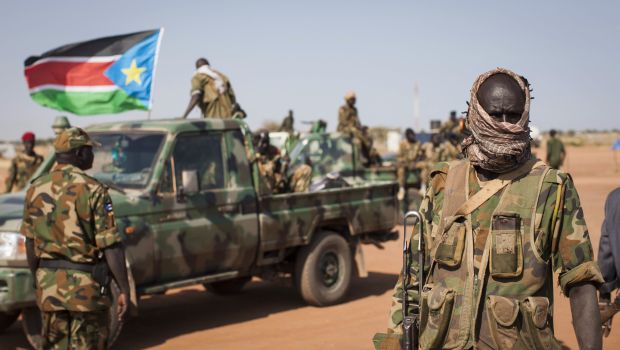
A South Sudanese government soldier stands with others near their vehicles, after government forces on Friday retook from rebel forces the provincial capital of Bentiu, in Unity State, South Sudan, Sunday, Jan 12, 2014. (AP Photo/Mackenzie Knowles-Coursin)
Talks will resume Tuesday on a proposed accord presented by East African mediators last week, Mabior Garang, a spokesman for the rebels, said on Monday in the Ethiopian capital, Addis Ababa, where the negotiations are being held. Discussions were adjourned so the two sides can consult on the issues of detainees, a state of emergency in the states of Jonglei and Unity, and the presence of foreign troops, he said.
Rebel forces are “closing in” on Malakal, capital of Upper Nile state, and expect to capture the town within 24 hours, Brig. Gen. Lul Ruai Koang, a spokesman for the rebels, said in an emailed statement Monday. He also said government forces were defeated in Juba county on Sunday.
The conflict erupted in the world’s newest nation on December 15 after President Salva Kiir accused former Vice President Riek Machar of trying to stage a coup, a charge Machar denies. The dispute escalated into clashes between members of Kiir’s ethnic Dinka community and Machar’s Nuer group. The death toll from the fighting is approaching 10,000, according to the International Crisis Group, while the United Nations says about 395,000 people have been forced to flee their homes.
The rebels last week dropped their demand that 11 politicians detained when the violence began be freed as a prerequisite for talks to start. The US, the UN and the EU have called for the release of the prisoners, who have been held without charge.
The insurgents are prepared to sign a cease-fire without the prisoners’ release, opposition spokesman Hussein Mar Nyuot said in an interview.
“We’ve not dropped the issue of detainees,” Garang said on Sunday. “We’ve dropped it as a precondition to create a better atmosphere for the government to also reciprocate and give concessions as well.”
South Sudanese Information Minister Michael Makuei said yesterday that rebel forces had “badly destroyed” oil fields in Unity state, where government forces last week recaptured the capital, Bentiu. Nyuot denied the claim.
“This is a false accusation,” he said. “We need these resources for the development of our country.”
South Sudan has sub-Saharan Africa’s largest oil reserves after Nigeria and Angola, according to BP data. Since gaining independence in July 2011, it has been exporting its crude—about 245,000 barrels a day—through pipelines across Sudan. The fighting has cut output to about 200,000 barrels daily, according to the government. Oil exports provide more than 95 percent of state revenue.
The fighting has halted most of South Sudan’s oil production, Linda Thomas-Greenfield, assistant secretary of state for African affairs, told the Senate Foreign Relations Committee last week.
“There’s some oil left in the pipeline but much of the pumping has ceased,” she said.
Companies including China National Petroleum Corporation and India’s Oil & Natural Gas Corporation have evacuated employees from the country.
The East Africa Law Society called on Monday for the removal from South Sudan of foreign troops, including Ugandan forces, who aren’t sanctioned by the African Union or the UN as they “do nothing but fuel the conflict.” The UN Security Council released a statement yesterday saying its members “discouraged external intervention that could exacerbate” existing tensions.
Uganda deployed troops in the country last month to prevent the conflict from escalating into “genocide,” the state-run New Vision reported on January 8, quoting army chief Gen. Katumba Wamala.
As many as 5,000 refugees are fleeing South Sudan daily to neighboring Uganda, the UN Refugee Agency said Monday.
